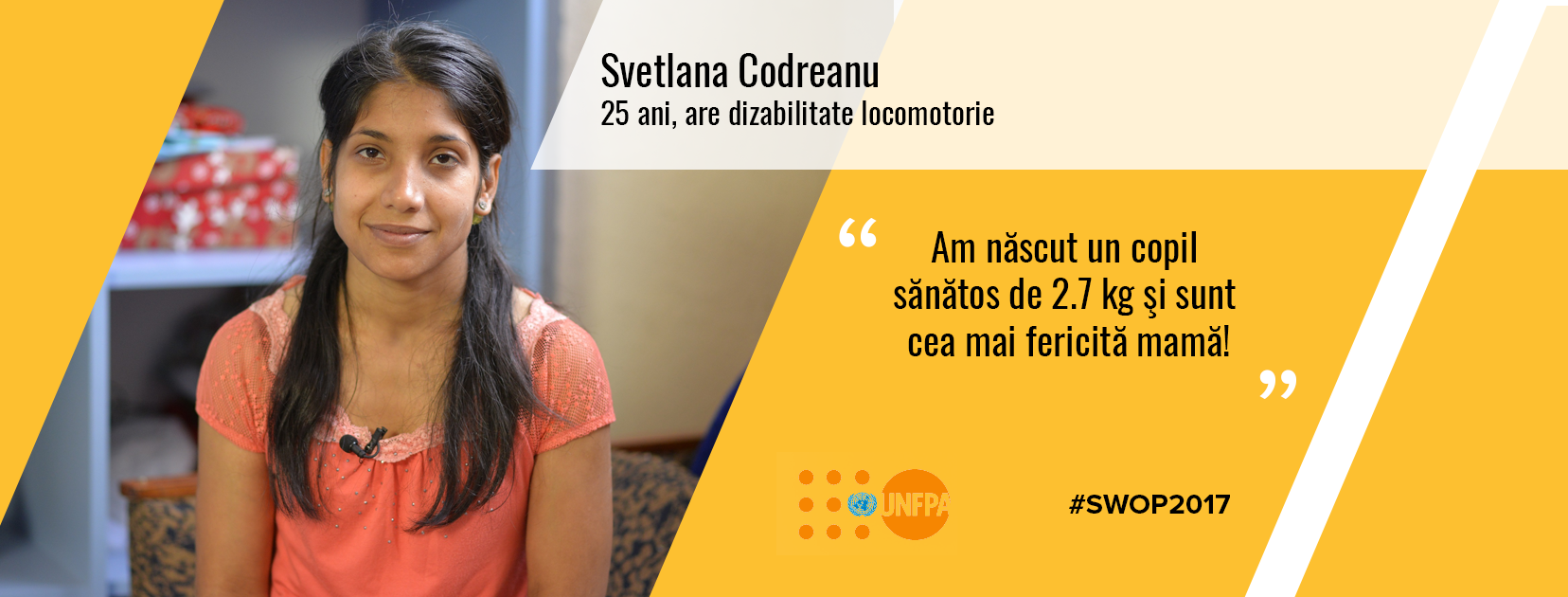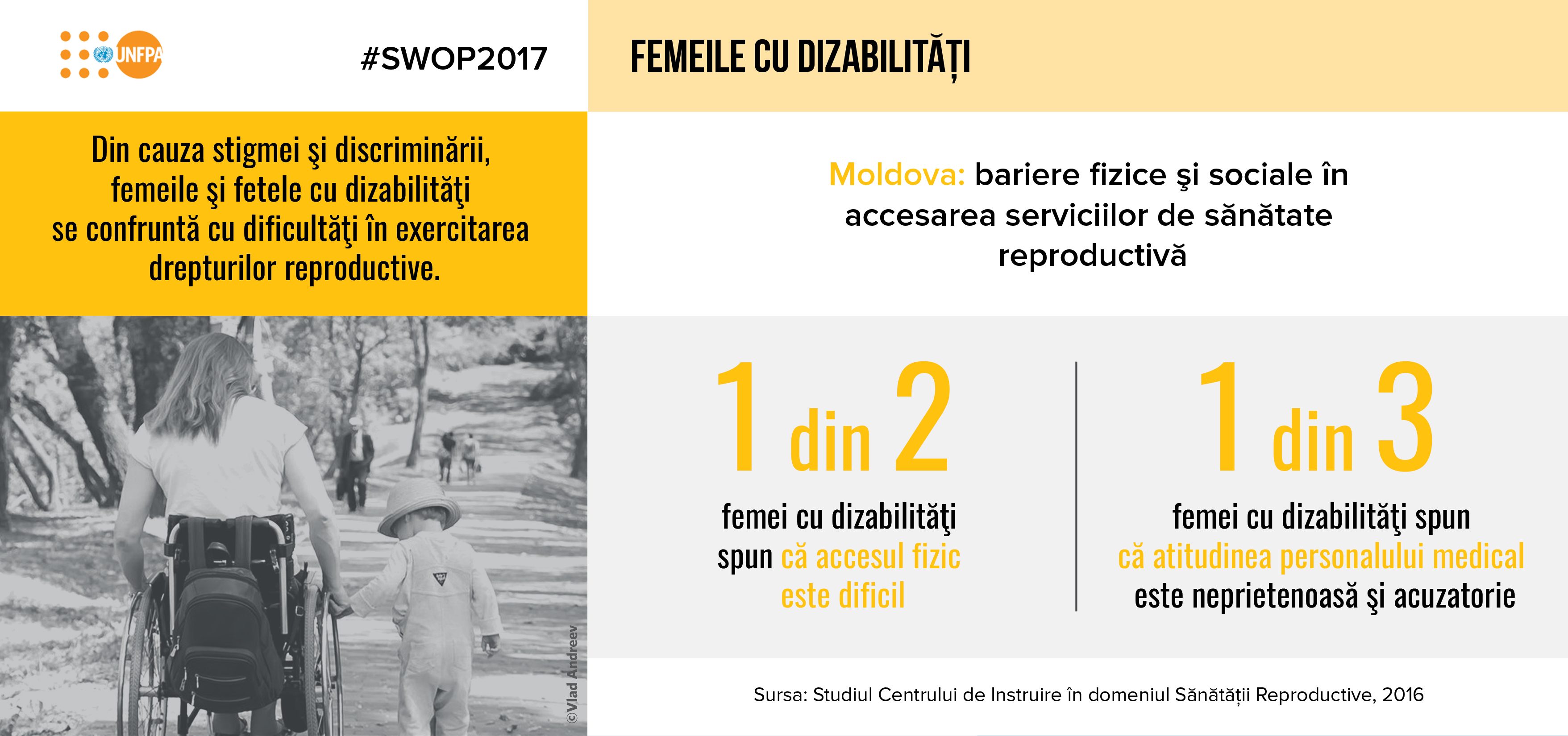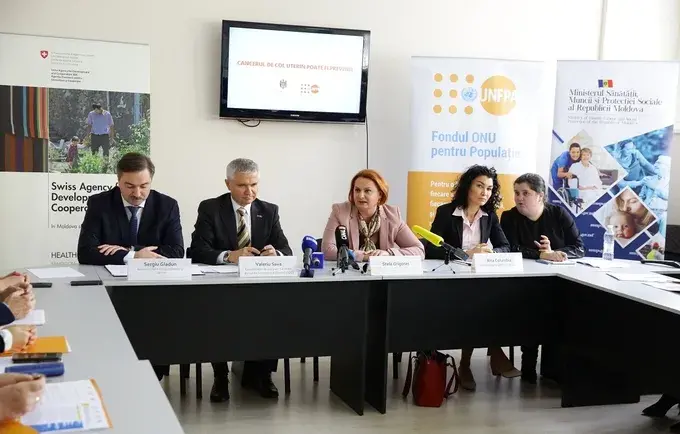Chisinau, 18 October – UNFPA, the United Nations Population Fund in Moldova, in partnership with the Swiss Cooperation Office (SDC) and the Ministry of Health, Labour and Social Protection, organised a joint launch of the initiative to fit out 30 youth-friendly health centres across the country with gynaecological equipment adapted to girls and women with disabilities. The event took place on 18th of October as part of UNFPA global launch of ‘The State of World Population 2017: Worlds Apart. Reproductive Health and Rights in an Age of Inequality’.
‘This is very timely issue, as globally and in the Republic of Moldova, we have the commitment to achieve the 17 Global Goals aimed at reducing inequalities by targeting the most vulnerable people. Reproductive health rights are critical variables in the solution to economic inequality, and can propel countries towards achieving one of the key Sustainable Development Goals - eliminating poverty, said Dafina Gherceva, UN Resident Coordinator and UNDP Resident Representative for the Republic of Moldova.
Rita Columbia, the UNFPA Representative, stated that the most affected by economic and social inequalities are the young, the girls and women from poor families, living in the rural area, who have some kind of disability. ‘We are happy to see that critical steps are made in Moldova to safeguard the reproductive rights of all girls and women, including those with disabilities. We call on all our partners to implement this good practice nationwide because every girl and every woman counts.’
About 187 thousand persons with disabilities live in Moldova. Half of them are girls and women. Most of them have acquired a disability during the lifetime. A Survey About the Reproductive Health of Women and Girls With Locomotor Disabilities, conducted by the Reproductive Health Training Center, reveals that only half of them go to the doctor, while every third of them believes that the attitude of the medical staff is unfriendly and reproachful.
‘The Ministry of Health pays increasing attention to granting the access of girls and women with disabilities to health services, including reproductive health services. We are grateful to our partners for having supported us in fitting out the 30 health facilities that girls and young women across the country have access to. In these centres they can be provided family planning services and free consultation, in a safe and confidential environment’, said Stela Grigoras, Minister of Health, Labour and Social Protection.
The medical facilities have been equipped with gynaecological seats adapted to the needs of women with disabilities as part of “Healthy Generation” project financed by SDC.
“Due to the stigmatization of disability, women with disabilities are often viewed and depicted as dependent, in need of care and asexual. They face numerous barriers to accessing sexual and reproductive health services. The Healthy Generation project has made a small but significant step towards affirming the sexual and reproductive rights of girls and women with disabilities in Moldova”, said Simone Giger, the director of the Swiss Cooperation Office in Moldova.
At the event, the attending girls and women with locomotor disabilities, coming from several districts of the country – among which young mothers with their young children – participated in a public dialogue about their needs. They spoke on their sexual and reproductive rights, which are still a taboo in Moldova.
‘We are triply discriminated. We are women, we have a disability and we want to be mothers. Although this is our right, we are still required to prove it. There are many success stories that show that we are ordinary people with special needs, which disappear in a fully inclusive and accessible environment’, mentioned Ludmila Iachim, Project Manager at MOTIVATIE Association.

Svetlana Codreanu, who came from Edinet together with her son – Danu, said that despite having a locomotor disability she gave birth to a healthy baby weighing 2.7 kg and today she is the happiest mom in the world.
The State of World Population 2017 Report was launched worldwide on 17 October and is available here.
As revealed in this Report, ten of the 25 equal countries in the world are in Central and Eastern Europe, Moldova being among the top five countries in the region. Nevertheless, there are huge disparities between countries and within them. Moldova, for instance, is among the 28 countries of the world where the skilled birth attendance is 100%. On the other hand, our country is far behind the developed countries in terms of maternal mortality, teenage pregnancy or access to modern contraception methods.

UNFPA also launched a short film about the reproductive rights of women with disabilities in Moldova: https://moldova.unfpa.org/ro/videos.



